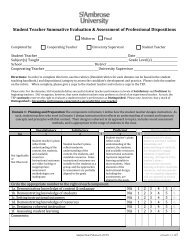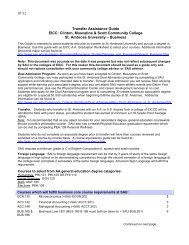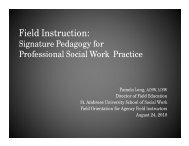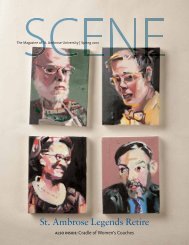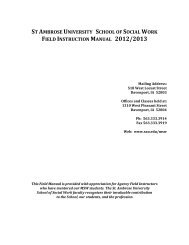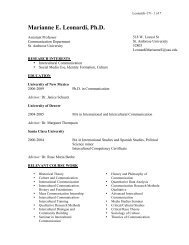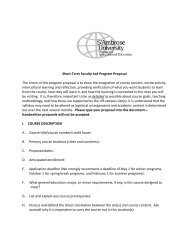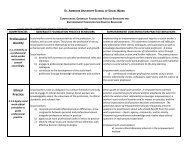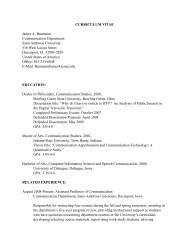Create successful ePaper yourself
Turn your PDF publications into a flip-book with our unique Google optimized e-Paper software.
Quercus<br />
a journal of literary and visual art<br />
Volume 21<br />
<strong>2012</strong><br />
(kwurkus) Latin. n. The oak genus: a deciduous hardwood tree of shrub.<br />
Editor: Jonathan Smith<br />
Art Editor: Veronica Swanson<br />
Literary Editors: Melisa Jackson<br />
Breanna Neubauer<br />
Literature:<br />
Amy Falvey<br />
Melisa Jackson<br />
Colin Long<br />
Breanna Neubauer<br />
Lizzy Oberhoffer<br />
Rachel Pasker<br />
Kelsey Rentfro<br />
Lindsay Schaefer<br />
Art:<br />
Jessica Barr<br />
Calista Heckman<br />
Katherine Moneysmith<br />
Jonathan Smith<br />
Veronica Swanson<br />
Advisor:<br />
Carl Herzig
Quercus publishes creative writing and artwork by <strong>St</strong>. <strong>Ambrose</strong> <strong>University</strong><br />
students, faculty, staff, and alumni. Address orders, contributions, and<br />
submissions to Quercus, <strong>St</strong>. <strong>Ambrose</strong> <strong>University</strong>, 518 W. Locust <strong>St</strong>.,<br />
Davenport, Iowa 52803 or HerzigCarl@sau.edu<br />
words<br />
cover image:<br />
Leslie Bell ’72<br />
Sky, Light, Flowers<br />
2011, oil on canvas, 48 inches x 55 inches<br />
first image:<br />
Leah Richter<br />
Suadade<br />
<strong>2012</strong>, india ink on bristol, 14 inches x 11 inches<br />
first center bleed image:<br />
Suzanne Michele Chouteau<br />
Black Water Horizon<br />
<strong>2012</strong>, reduction woodcut, 48 inches x 60 inches<br />
second center bleed image:<br />
Calista Heckman<br />
<strong>St</strong>range Fruit<br />
2011, oil on canvas, 24 inches x 30 inches<br />
inside back cover image:<br />
Grant Legan ’10<br />
Beautiful Isolation 2<br />
2011, digital photography<br />
Fall Hard<br />
Batiquitos, Defender<br />
Whatever, Whichever<br />
Breaking Bread: Three Movements<br />
Yellow-Breasted Robin<br />
Backyard Warrior<br />
My Best Friend<br />
Rag Doll<br />
A Keepsake<br />
En Tijuana<br />
Falling in Love While Dancing<br />
Filter<br />
Tranquil Night Thoughts<br />
Karussel or The Carousel<br />
Beginnings<br />
Driver-Assist<br />
A Trinity of Adams and Eves<br />
Maria DeSio<br />
Chuck Blair ’76<br />
Amy Falvey ’05<br />
Sarah Wurst ’11<br />
Eda Hoffman ’81<br />
Carrie Chesney ’02<br />
Holly Norton<br />
Kyla Hadenfeldt<br />
Liu Xeuyan<br />
Zach Honert ’11<br />
Maria DeSio<br />
Nancy Hayes<br />
Zach Honert ’11<br />
Joseph Burrows<br />
Fr. Bud Grant ’80<br />
7<br />
8<br />
10<br />
12<br />
18<br />
19<br />
57<br />
58<br />
59<br />
60<br />
63<br />
64<br />
66<br />
68<br />
69<br />
71<br />
78<br />
This edition is offered with love and gratitude to Leslie Bell—<br />
retiring this year—whose energy, spirit, wisdom, artwork, and<br />
critical acumen have since Quercus’s founding twenty-one<br />
years ago helped define the journal’s identity and enrich its<br />
heart and soul.<br />
Copyright © <strong>2012</strong> by Quercus<br />
All rights retained by the authors and artists
images<br />
Reflection<br />
Living Reflection<br />
Beautiful Isolation<br />
Peoplescape 2<br />
What Just Happened in There?<br />
Refuge<br />
Sisters: Twisters<br />
Night Caravan<br />
Movement 1<br />
Movement 2<br />
Cusco<br />
Montañita<br />
Satori <strong>St</strong>udies: 2 Horsemen<br />
Satori <strong>St</strong>udies: Boys with Guns<br />
Moulder<br />
Full Bloom<br />
Catch the Moon<br />
Kites<br />
Mushrooms<br />
Turtle Falls<br />
The Sling<br />
Blue Nude<br />
To Alexander Mcqueen<br />
Realized Obligation<br />
Orange Sadhu<br />
Chilled Skin<br />
Robert, Samurai Dancer<br />
Movements<br />
Lora Wegener<br />
Chris Bain ’09<br />
Grant Legan ’10<br />
<strong>St</strong>eve Berger ’78<br />
Kevin Cartwright<br />
Leslie Bell ’72<br />
Kristin Quinn<br />
<strong>St</strong>eve Andresen<br />
Adrianna Corby<br />
Angela Wilson<br />
Zachary Cleve ’10<br />
Carli Shieferdecker<br />
Sarah Wurst ’11<br />
Leah Richter<br />
Cali McCleary<br />
Munir Sayegh ’11<br />
Carl Herzig<br />
Kyla Hadenfeldt<br />
Katie Kiley ’74<br />
<strong>St</strong>eve Andresen<br />
11<br />
29<br />
30<br />
31<br />
32<br />
33<br />
34<br />
35<br />
36<br />
37<br />
38<br />
39<br />
45<br />
46<br />
47<br />
48<br />
49<br />
50<br />
51<br />
52<br />
53<br />
54<br />
55<br />
56<br />
57<br />
77
Fall Hard<br />
I don’t want to grow up for a lot of reasons<br />
& for no reason at all. The perfection<br />
of nineteen hangs on the edge<br />
of childhood & magic, like high school football<br />
or the first time I saw my dad cry. It’s art,<br />
fleeting and fragmented, praying to be drawn:<br />
I fall hard for my freedoms, and I dream<br />
too much most days, but I’m not worried—<br />
I have time spilling out of empty pockets<br />
& I write poetry in the middle of the night.<br />
I knew more of what I wanted when I was five<br />
& I still wish on fallen eyelashes.<br />
Maybe someday I’ll find the words to write<br />
poems about the beauty of growing old.<br />
—Maria DeSio<br />
7
Batiquitos, Defender<br />
In Carlsbad at dusk you watch<br />
the bald spot of silver water slip between<br />
a tidal passage descending<br />
on the upper Batiquitos Lagoon<br />
near and far from the sandbars<br />
stolen from Indians,<br />
and the water grows stronger<br />
with each pass, rustling Goldenrush<br />
on a 4th of July eve. Liquid fields<br />
grow across the caramel stands<br />
where two shiny crows take nips<br />
out of the shoreline.<br />
<strong>St</strong>ep forward, Defender, into the pool<br />
and float against the dead<br />
while dropping warm feathers<br />
from the filter of your wings,<br />
sealing your father and mother in a crystal skin. Never mind<br />
the pool is oceans, and sandstone cliffs<br />
surround this peninsula of water.<br />
Time rests in the fields of irrigated light<br />
striking eucalyptus and leaves leaving<br />
the wetland of a dream entered<br />
on the judgment of a moonlit night.<br />
At this landing you study<br />
childhood’s immortal pain, some<br />
real and mystical, and some invented,<br />
and now how do you function by retrieving stillness from<br />
death<br />
in the drowning afterlife?<br />
****<br />
The man has been wading in water<br />
for decades. Suddenly, to blot out<br />
the smell of defeat, he decides<br />
to write in orange juice across his chest.<br />
He is relieved that his words,<br />
because he has loved,<br />
are no longer about sex, not even<br />
about love, before shutting off the lamp<br />
at his writing desk. Marriage tells him<br />
to finish his tale and revisit the dots<br />
of his blood held in its place.<br />
In months to follow, after more tossing<br />
and turning, he buys bags<br />
of oranges with a credit card<br />
and a shaky signature at the fruit stand<br />
across the rumbling roadway.<br />
Later he will begin to write about<br />
the duality of light and love, again<br />
taking off his glasses, resting his head<br />
on his wife’s sacred shoulder,<br />
reminding himself that sleep is as sacred<br />
as the uncertain bitterness<br />
of the orange’s cratered skin<br />
tearing under his fingernails<br />
like the trap of some disorder<br />
leftover on the drifting moonlight<br />
slipping at his rock face<br />
with the Great Blue Heron<br />
and the Snowy Egret<br />
and lesser shorebirds<br />
wading into memory<br />
like a wingtip dipped in water.<br />
—Chuck Blair ’76<br />
8 9
Whatever, Whichever<br />
On the day of Paul and John in June, is how the story goes.<br />
Children or rats, led away to drown. Some say the piper was<br />
death;<br />
some say pestilence, pedophilia, war, emigration.<br />
But either way, and whichever end,<br />
there is a street in Hamelin, still, where no voices sing<br />
but the dead chatter.<br />
Some record reads, “It has been 10 years since our children<br />
left.”<br />
Some scholars say that the children were sold for profit when<br />
Hamelin<br />
was hard up for cash.<br />
Some fairytailers write of a deaf one and a lame one left<br />
behind,<br />
rats scurrying about the streets,<br />
bodies not tradable or exchangeable for money, sex,<br />
crusades.<br />
Inaudible chords of his pipe, unkeepable steps with his legs.<br />
Was it subjection or resistance? Either way, whatever end,<br />
whichever story, the dead still chatter.<br />
—Amy Falvey<br />
Lora Wegener<br />
Reflection<br />
<strong>2012</strong>, photography, digital collage, 10 inches x 8 inches<br />
10
Breaking Bread: Three Movements<br />
First Movement<br />
I go to the place where everything is turned upside down<br />
and/or inside out<br />
and I make walls. I write on them with blue paints, so they<br />
tell me<br />
“Don’t come back, hear?” so they tell me: eat, eat, eat<br />
until I’m full, and then eat more. “Did you save room for<br />
dessert?”<br />
maybe, maybe I should have.<br />
I close my eyes,<br />
don’t know if I’m making words or just<br />
typing letters to the rhythm of the speeding train, rocking<br />
back and forth, a cradle that night we fell through:<br />
the eleven o’clock news murmuring away,<br />
turning words into water, and water into wine,<br />
singing hymns to the sound of the metronome<br />
on the coffee table (sinners). the fourth story.<br />
or the thousandth. it is<br />
never enough.<br />
write, she says: write.<br />
with your eyes closed. with your headphones on. on your<br />
way to the city.<br />
with your hands tied behind your back;<br />
write.<br />
with your dirty hands,<br />
write<br />
the poems that spit and swallow,<br />
fistfight and stab,<br />
kill for the death of war.<br />
I’ve been trying to wrap you like the rhythms of that train,<br />
hold you like a baby in the night. but I think<br />
baby baby, I am not for you. this is not for me. you are wrong again.<br />
I think<br />
poems are coming and coming and coming and<br />
they all keep dying//right in my arms.<br />
I am trying, desperately, to save them.<br />
but always, they expire.<br />
I have blood, not ink, dripping from my fingers.<br />
blood: of the whip, on my jeans, in the toilet bowl,<br />
the color of my fingernails; “this is the blood of our Lord<br />
and Savior . . .”<br />
I have never seen so much<br />
running out and down<br />
the door of my fridge;<br />
I am dreaming in red,<br />
or the blue-black<br />
of this story. on the fifth story. or the seventieth.<br />
seventy times seven prescriptions<br />
for penitence///expiring.<br />
this circle of body of blood / of nation / of race<br />
of culture / of class / of city / of state / of nuclear bomb<br />
/ of sex of love of death / of circles /<br />
of waiting rooms and hospital beds,<br />
pumping blood, pumping blood,<br />
and overhead the tv’s pumping<br />
stories, framing<br />
colors: amber, gold, and god rush rushing (“it is<br />
never enough”) see . . .<br />
12 13
what is this sea of red red black roses?<br />
oh savior, unburden these bodies/of water!<br />
what is this lipstick, the color of the sea?<br />
parting slowly, O P E N W I D E and just<br />
eat like horses; no, eat<br />
like pigs . . .<br />
I have never seen so much<br />
blood oozing out from the pages of books<br />
bleeding between lines, sinking down walls,<br />
after dark: don’t come back, hear? to judge the living<br />
the living and the dead I am<br />
writing blank checks (I am<br />
painting them blue); this is<br />
his body, her body, the blood given up for<br />
I have never seen so much.<br />
Second Movement<br />
see, the words across the dinner table<br />
are on fire.<br />
but you’ve heard the story, this story<br />
before. you know how it goes. you know where it ends.<br />
you know where the middle turns up and out.<br />
“You know where to go<br />
when things die.”<br />
and at the fork’s unrest, and the violin’s cry<br />
(you’ve heard this story this story before)<br />
she’s praying on books<br />
without pages or names<br />
she knows all the lies///of the savior (in her sleep)<br />
of the bile and the milk, and the orange sky ceases<br />
to tell him the name of tomorrow.<br />
“Tomorrow,” she says,<br />
“will have eaten its full.”<br />
(Write, she says, write,<br />
with your dirty hands/// tied behind your back)<br />
(Write, she says, write,<br />
for you are only///what you eat)<br />
write, she says,<br />
for the death of war (it is never<br />
never enough).<br />
and beneath the train, in its swings and jolts,<br />
its tired sighs and its sleeping dreams,<br />
I think I can I think this is<br />
no covenant of love.<br />
“This is our country, my country”<br />
he says he knows where a nation<br />
goes when it dies.<br />
“These orange skies are mine” he says<br />
and the amber waves and weaves the lies<br />
of skin too dark/or hair<br />
/too dark/of love/<br />
too dark for his<br />
“taste” of heaven:<br />
the mouth that waters, the mouth that reeks<br />
lies<br />
of honey, milk, and bile.<br />
and eats the<br />
time cards and punch lines, phantoms and ticker-tape<br />
14 15
:they know where they’re going; they know<br />
where and how they’re going to get there;<br />
they are marching, marching.<br />
left. right. left.<br />
but she, she sees them,<br />
the red wine chords in this this room<br />
stretching their cadence across infinite atoms<br />
that are making hymns he could never hear<br />
and strings them through her fingers:<br />
///a web of sound///where he is deaf.<br />
names/psalms/hallelujahs in the dark<br />
date/place/time time<br />
when are you coming, coming back home?<br />
mad hatters humming down halls<br />
of names and psalms//running out faster<br />
than the veiled orange and undulating sky<br />
where he pleads and pleading<br />
give me more, and more to crave<br />
the fork’s unrest (slow, and slowing)<br />
but she she dreams<br />
that the violin’s drinking that it heaves and sighs<br />
and sinks its teeth and retches<br />
bile.<br />
you crazy fools she thinks in the silver//of the cake plate.<br />
zippersbuttonslacesglue<br />
scotchtapeducttapeelectrictape fire.<br />
we’re keeping things together now its<br />
alice through looking; the places are set, there are<br />
tea cups to break,<br />
and there is alchemy spilling all over the tablecloth<br />
this is: the piercing relent of the clock, it is:<br />
the book without binding that is underneath the sternum<br />
and the names without faces and the arms without legs<br />
and the ears without arms and the hands without hearts.<br />
so many rabbit holes,<br />
common as puddles.<br />
—Amy Falvey ’05<br />
Third Movement<br />
she’s got somebody, or something, for every<br />
missing thing: someone to mend the potholes,<br />
and something to paint the void cherry red;<br />
it’s as common as puddles and as ambivalent as rain,<br />
16 17
Yellow-Breasted Robin<br />
Backyard Warrior<br />
it was summer,<br />
and Deb and I sat<br />
on the back porch<br />
drinking beers, debating<br />
what new kind of bird<br />
we’d spotted in the crab-apple tree.<br />
Mom was not home<br />
so we couldn’t ask,<br />
both of us claiming<br />
the bird was new.<br />
it danced or fought<br />
with a cousin<br />
up into the white of the sky,<br />
singing, singing<br />
or screaming, screaming.<br />
I’d seen it flying<br />
as my bike lay<br />
on the grass<br />
next to the old high school track,<br />
front wheel still spinning.<br />
I stalled and watched,<br />
not really afraid,<br />
the perfect water<br />
from the spigot<br />
blessing and cursing<br />
my hands and feet.<br />
—Sarah Wurst ’11<br />
Iocaste stood in the doorway with an ice-cream bucket full of<br />
toads, her mud-smeared brow heavy with contemplation. She<br />
bit her lips, tapped her fingers on the bucket and waited for<br />
her grandmother to finish kitchen-bustling and listen to her<br />
inquiry.<br />
She couldn’t wait any longer. “Grandma!”<br />
Molly had been doing about seven things at once, as<br />
was her habit in the kitchen. She hummed an old bluegrass<br />
tune, tapped out the beat with a wooden spoon on her<br />
leg, stirred potatoes and chopped orange peppers. At the<br />
piping of the small voice, Molly started, made a rabbit-like<br />
movement and then allowed her attention to fall on the<br />
small, silhouetted figure of her youngest granddaughter in<br />
the doorway.<br />
“Grandma,” the figure said, “Winston and Theodore<br />
need a home where they will be safe from the toad hunters<br />
who are trying to harvest their skin to use as poison in their<br />
darts.”<br />
Molly’s gaze fell on the bucket and the nebulous<br />
shadowed forms that hopped inside. Then Molly looked<br />
over Iocaste’s shoulder at her other granddaughter, Amelia,<br />
who remained in the yard. This one was decked out in some<br />
sort of war paint and was ravaging around the yard throwing<br />
a pointy stick at trees and bushes. Molly hoped the marks<br />
that were now smeared on her granddaughter’s cheeks<br />
were water-soluble and remembered the horrible instance<br />
when the girls had gotten into some old house-paint and<br />
smeared it all over themselves, claiming they had found<br />
“blue sunscreen.” It seemed that someone had been reading<br />
up on poison dart frogs and their indigenous uses. As usual,<br />
some details had been skewed, as Amelia was now using a<br />
stick instead of blow darts and sought common toads instead<br />
of vibrantly colored tree frogs. Molly couldn’t say that she<br />
was sad for these incongruities, picturing blow darts being<br />
accidentally sucked in and wedged into small windpipes.<br />
Iocaste’s concern was growing more acute. Her<br />
18 19
chestnut eyes were beginning to swell and she let out a small<br />
squeak. Molly wiped her hands on her apron and looked<br />
in the bucket. Winston and Theodore were the toads that<br />
lived under the back porch. Iocaste had taken it upon<br />
herself to care for the two, collecting the flies out of the<br />
house’s windowsills and sticking them to a leaf of lettuce<br />
with drops of honey and leaving it out for them. This was<br />
probably the most well-fed and spoiled pair of amphibians<br />
in the mountains. The fattened couple commonly visited<br />
Molly while she had her morning coffee on the porch. She<br />
marveled at the way they could hop their giant toad bodies<br />
up the wooden, dew-damp steps. Molly didn’t particularly<br />
fancy losing the fist-sized companions to the warrior in<br />
the yard who now hung from a tree branch by her knees,<br />
scanning the grass for movement.<br />
“Looks like it’s a good thing you caught them,” Molly<br />
said. “Now what exactly is your plan?”<br />
Iocaste spoke quickly, as if to get the questionable<br />
suggestion out of her mouth before she could think about<br />
her grandmother’s reaction to the words. “I was hoping,<br />
since the outdoors is no longer a safe places”— a fierce war<br />
cry punctuated the silence of the backyard— “that they could<br />
live in the house for a while!” Iocaste ended her sentence<br />
in a panicked pitch. As if sensing their protector’s anxiety,<br />
Theodore and Winston thumped around more rapidly in<br />
the bottom of the bucket.<br />
Molly hesitated, considering the state of her<br />
home. This was a house filled with floorboards that were<br />
accustomed to muddy footprints, spilled houseplant soil,<br />
and all matter of other messes, accidental or planned.<br />
That being said, Molly feared that allowing toads to live in<br />
her bathtub or in some toad pen for the time being was a<br />
slippery slope. Insects in jars were one thing. Those could sit<br />
contained on nightstands and be easily released. Toads were<br />
a different story, especially those with the muscle mass of<br />
Theodore and Winston. Let toads in the house, Molly<br />
thought, and the next thing I know I’ll be a zookeeper.<br />
We might as well live outside. No, there had to be another<br />
option. The hunting grounds had to be moved.<br />
“Amelia!” The distant cry was familiar to the young<br />
Incan warrior, but was from a less interesting place in her<br />
life. Currently she was on her hands and knees under a<br />
chokecherry bush. She dug her fingertips into the myrtle<br />
and pressed into the soil beneath the lush vines. She<br />
brought her hand back up and examined her fingernails<br />
with disappointment; this soil was desert-dry. Because of<br />
her research, Amelia knew that her quarry liked to keep<br />
near moist areas. Her best bet was probably to go down the<br />
creek, but she was reluctant to leave the yard, as she had seen<br />
hopping things in the grass on many occasions when she<br />
was not searching for them. She did not know what exactly<br />
she was going to do with the creature once she caught one,<br />
though she knew that real Incan warriors used the skin of<br />
frogs to poison their darts. Amelia hoped that she would<br />
only need to prick the skin with her pointed stick to procure<br />
some poison. Once, she had accidentally stepped on a baby<br />
toad. The memory of the carnage that greeted her when<br />
she had lifted her bare foot made her nostrils flare. No, she<br />
would not be skewering any animals today; she just wanted<br />
to test her new knowledge. Amelia had sat on the front<br />
sidewalk all morning scraping her stick on one end until it<br />
was worn down to a point. While she was a veteran at this<br />
not very laborious process, it did take some patience. Amelia<br />
liked to sing songs to accompany the scraping. Today the<br />
tune that escaped her followed the tales of a great warrior<br />
who protected her village with the help of the elusive poison<br />
dart frog.<br />
These frogs looked like drops of sunshine to Amelia<br />
when she had first seen a picture of one in the book in her<br />
grandfather’s old library. In his lifetime, her grandfather had<br />
collected a marvelous array of books, and Amelia loved<br />
20 21
to spend time among them. Amelia’s favorite smell in the<br />
world was the scent of the books’ dusty old pages. She would<br />
close her eyes and imagine sitting at her grandfather’s feet<br />
as he read her stories in his composed and indulgent voice.<br />
He used to tousle her short sandy hair when she laughed or<br />
asked a good question. Sometimes, now, when she sat in the<br />
old worn Victorian chair, she still could hear that calm voice,<br />
pointing her to different sections of the library. It had been<br />
like that the night before when she had discovered poison<br />
dart frogs.<br />
Amelia had retreated to the basement, content<br />
and groggy from a dinner that comprised mostly of sweet<br />
snapping peas in the pod and canary-colored corn. (Both<br />
of the girls’ habits of skipping over main courses and eating<br />
primarily vegetables and sourdough bread increasingly<br />
vexed their grandmother. But to Iocaste and Amelia it<br />
was second nature to savor the tomatoes and cucumbers,<br />
taking luxurious bites of the vegetables that were sometimes<br />
sprinkled with sugar, but were more often eaten plain.) Once<br />
in the library, Amelia had stretched out in her grandfather’s<br />
chair with her mother’s worn copy of Watership Down. She<br />
was anticipating the adventure reminiscent of the garden<br />
that had supplied her supper, when she reached up to dim<br />
the citrus-colored lamp, whose light rested on the old pages<br />
and dusted rose upholstery. In doing so, another book on<br />
the shelf caught her eye. She walked over, tenderly removed<br />
it from the shelf, and discovered the pictures that sent her<br />
on a journey of building excitement.<br />
The bedtime summons filtered into Amelia’s<br />
consciousness and she made her way up the stairs, book in<br />
tow. Amelia placed the book under her pillow and let her<br />
head drop on top of it. After Molly had shut off the light,<br />
Iocaste asked if the book had been lonely in the library and<br />
if it had wanted to sleep with Amelia for the night. Amelia<br />
looked at the twinkling chocolate eyes of her sister<br />
and indulged her with the stories of all she had learned.<br />
Did Iocaste know that the more colorful a frog, the more<br />
poisonous it was? Or that other frogs sometimes evolved<br />
to have color in order to look more poisonous? Amelia’s<br />
whispers lulled her sister to sleep, and Amelia was left<br />
listening to the night noises: her buzzing, sleeping sister,<br />
the crickets in the woodwork and the whirring ceiling<br />
fan. This soundtrack set the images of her new alternate<br />
identity as an Incan warrior swirling and melding in her<br />
head until she joined her sister in dreamland.<br />
Aerodynamically, it never should have worked.<br />
Driven by the notes of her hummed Incan warrior<br />
ballad, Amelia climbed to the highest tree in the yard in<br />
order to get a better view of the grassy habitat of her prey.<br />
Finally seeing what must have been perhaps a cousin of<br />
Theodore and Winston, she had let go of the branch and<br />
hurled herself towards the hopping adversary, pointy stick<br />
held before her. She imagined herself to be some sort of<br />
flying squirrel hybrid, jetting through the air with the<br />
savage poise of a warrior. Problem was, she did not have<br />
the flaps of skin connecting her wrists to her ankles as a<br />
flying squirrel did and severely misjudged how far the air<br />
could take her. Luckily or unluckily, the toad sensed that<br />
it was under attack and started to frantically scuttle-jump<br />
about. But due to the underdeveloped escape skills of the<br />
backyard toad, it hopped in the wrong direction, straight<br />
into the looming shadow of the falling warrior overhead.<br />
Forgetting the mortality of the toad and herself in the thrill<br />
of the moment, Amelia took her stick in both hands and<br />
aimed directly for the confused hopper. Then she felt the<br />
hot contact of her body hitting the hard, dry ground. The<br />
Incan warrior was no more. Instead Amelia was reduced to<br />
a bruised and gasping ten-year-old girl who, at the moment,<br />
was having trouble focusing on the two people rushing<br />
towards her from the house.<br />
22 23
Molly and Iocaste had a premium view of Amelia’s<br />
desperate leap from their spot on the back porch. Molly<br />
had watched her granddaughters climb many trees and<br />
held a lot of faith in their ability not to fall. Thus she was<br />
not too concerned as Amelia had taken stance at the end<br />
of the flimsy branch. She knew her oldest granddaughter<br />
well enough, however, to know when she was about to let<br />
go. She watched the tiny ribcage expand, and before Molly<br />
could shout out a warning, a blur of war paint and skin was<br />
dropping through the air. The whole thing happened so<br />
fast. One minute, the agile body clung safely to the branch;<br />
the next she was lying in a crumpled heap on the ground.<br />
Iocaste took off at a speed Molly had rarely seen her reach,<br />
and Molly lifted up her apron and followed. The ice-cream<br />
bucket was dropped and Winston and Theodore gratefully<br />
made their escape.<br />
As soon as they saw that Amelia’s eyes were open<br />
and moving about, Iocaste and Molly were able to survey the<br />
damage with some composure. Amelia had broken her fall<br />
with her feet and crashed onto her stomach. Her head was<br />
turned toward the porch and her arms and legs sprawled<br />
like a crushed spider. Molly clutched her apron and kneeled<br />
down in the grass. Iocaste leaned down to talk to her fallen<br />
sister.<br />
“Can you move?” Iocaste asked.<br />
“Maybe.” The ghost of hysteria lingered behind<br />
Amelia’s eyes. “I can’t breathe.”<br />
“You fell hard,” Molly said. “You probably knocked<br />
the wind out of yourself.”<br />
“I’ll help you!” offered Iocaste, and she began to lift<br />
Amelia’s shoulders.<br />
Amelia protested, “Give me a minute, will ya?”<br />
“Where does it hurt?” Molly asked the question like<br />
a broken record player.<br />
“Everywhere!” Amelia complained, some of the<br />
normal vigor entering into her voice.<br />
“I’ll get you a band-aid,” Iocaste volunteered.<br />
“No!” Amelia, unlike other kids, deplored band-aids.<br />
They were a sign that she had accepted defeat, an undeniable<br />
sign of injury, failure and pain.<br />
Molly couldn’t help smiling at the spirit. “Well, then<br />
you better get up. Good thing you’re tough.”<br />
Amelia made a great show of peeling herself off<br />
the ground. She was a champion of the dramatic injury<br />
balancing act, with a keen awareness of the fine line that<br />
lay between being hurt enough to earn extra strawberry ice<br />
cream and being so wounded that Molly wouldn’t allow her<br />
to play outside. Unfortunately, this time in the middle of her<br />
theatrical grimaces and wincing, Amelia met with actual<br />
pain.<br />
Amelia yelled as her left ankle gave out. Then the<br />
tears came. All the excitement and terror culminated in<br />
one overwhelmingly painful ankle. Bugger, she thought.<br />
The worst punishment was always sustaining an authentic<br />
injury. This meant that she faced a couple of days of<br />
sitting inside and being taunted by the sunshine. Iocaste,<br />
not used to seeing such displays of emotion from Amelia,<br />
became worried and started to cry, too. Molly looked at her<br />
granddaughters covered respectively in paint and mud and<br />
sitting in the yard with tears running down their faces. They<br />
were endearing even in their worst moments.<br />
“Let me see it,” Molly said as she reached over to<br />
Amelia’s ankle. “It’s already swelling. Just a sprain. You’re<br />
going to be fine.”<br />
Amelia’s already-splashing bucket of emotion<br />
overflowed as relief was dropped into it. She cried even<br />
harder. Iocaste flung her head into Amelia’s neck in an<br />
uproar of her own respite, free of the fear for her toads and<br />
for her sister.<br />
“Girls,” Molly amicably pleaded. “You’re both okay.<br />
Amelia, can you stand on one leg so we can get you hopping<br />
to the house?”<br />
24 25
Amelia took a giant, soupy inhalation. Iocaste<br />
wiped her dripping nose on Amelia’s sleeve, leaving a trail<br />
of paint, mud, tears and snot. Iocaste giggled. Then Molly<br />
giggled. Amelia scowled. Then Iocaste screamed. Amelia<br />
and Molly looked at her with alarm and followed the<br />
direction of her panic-stricken eyes. Then the two of them<br />
joined in the scream. Amelia’s stick had perfectly punjied<br />
the toad. Lying in the grass not a foot away from them was<br />
the gruesome sight. The toad’s eyes were still bulging from<br />
his last moments of acute fear. Iocaste, Amelia and Molly<br />
all screamed for a while longer. Then, as if subconsciously<br />
coming to a consensus, Iocaste helped Amelia stand up.<br />
Molly delicately picked up the non-toad-drenched end of the<br />
stick, and they all hobbled down to the creek where Molly<br />
unceremoniously chucked the shish-kebabbed toad into<br />
the current. As soon as they lost sight of the corpse, they all<br />
allowed themselves to be overtaken by shivers of revulsion.<br />
Molly bent over, clutched her hands between her knees in<br />
her apron and let out the longest Ewwwwww sound the girls<br />
had ever heard. Amelia, still leaning on Iocaste, was emitting<br />
sounds like a struggling motorbike, and Iocaste let out small<br />
yelps every time she exhaled. Soon they all erupted into<br />
disgusted peals of laughter.<br />
Later, after Amelia’s ankle had been wrapped and<br />
the three of them were sitting safely in the living room,<br />
Molly implemented strict rules regarding no forms of<br />
weaponry or violence being allowed at playtime. Animals<br />
like Theodore and Winston should not have to live in fear<br />
in their own home. Both Amelia and Iocaste were concerned<br />
about what happened to the murdered toad. Molly assured<br />
them that a burial at sea was respectful and often utilized<br />
by pirates and sea merchants for deceased heroes of the<br />
water. Amelia piped up that amphibians were creatures of<br />
the water, so that was perfect for the toad. Iocaste extended<br />
a tiny concern about her sister being a killer. They conferred<br />
about how Amelia could make it up to the toad kingdom<br />
for killing one of its treasured members. In the end, it was<br />
decided that Amelia would assist Iocaste in the care of<br />
Winston and Theodore and with any other toads that she<br />
came across. The crew had been healed and a peaceable<br />
kingdom implemented. And there was no dissention from<br />
even the paintiest of the troops.<br />
—Sarah Wurst ’11<br />
26 27
Chris Bain ’09<br />
Living Reflection<br />
2011, oil on panel, 48 inches x 37 inches<br />
28
Grant Legan ’10<br />
Beautiful Isolation<br />
2011, digital photography<br />
Grant Legan ’10<br />
Peoplescape 2<br />
2009, digital photography
“What Just Happened?”By <strong>St</strong>eve Berger October 2011 Acrylic 24”x30”<br />
<strong>St</strong>eve Berger ’78<br />
What Just Happened in There?<br />
2011, acrylic on canvas, 30 inches x 24 inches<br />
Kevin Cartwright<br />
Refuge<br />
2010, digital collage, 11 inches x 8.5 inches
Leslie Bell ’72<br />
Sisters; Twisters<br />
2011, oil on canvas, 36 inches x 30 inches<br />
Kristin Quinn<br />
Night Caravan<br />
<strong>2012</strong>, oil on canvas, 48 inches x 36 inches
<strong>St</strong>eve Andresen<br />
Movement 1<br />
2011, oil on canvas, 36 inches x 48 inches<br />
<strong>St</strong>eve Andresen<br />
Movement 2<br />
2011, oil on canvas, 36 inches x 48 inches
Adrianna Corby<br />
Cusco<br />
2011, oil on canvas, 36 inches x 48 inches<br />
Adrianna Corby<br />
Montañita<br />
2011, oil on canvas, 36 inches x 48 inches
Angela Wilson<br />
Satori <strong>St</strong>udies . . . 2 Horsemen<br />
<strong>2012</strong>, gouache, graphite on paper, 11.5 inches x 8.5 inches<br />
Angela Wilson<br />
Satori <strong>St</strong>udies . . . Boys with Guns (Afghanistan)<br />
<strong>2012</strong>, gouache, graphite on paper, 12 inches x 9 inches
Zachary Cleve ’10<br />
Moulder<br />
2011, oil on canvas, 48 inches x 60 inches<br />
Carli Shieferdecker<br />
Full Bloom<br />
2011, oil on canvas, 18 inches x 24 inches
Left: Sarah Wurst ’11<br />
Catch the Moon<br />
2011, oil on linen, 5 feet x 2 feet<br />
Right: Sarah Wurst ’11<br />
Kites<br />
2011, oil on linen, 5 feet x 2 feet<br />
Left: Sarah Wurst ’11<br />
Mushrooms<br />
2011, oil on linen, 5 feet x 2 feet<br />
Right: Sarah Wurst ’11<br />
Turtle Falls<br />
2011, oil on linen, 5 feet x 2 feet
Leah Richter<br />
The Sling<br />
<strong>2012</strong>, mixed media on canvas, 4.5 feet x 3 feet<br />
Text: “all of them, from the softest talc to the most impenetrable<br />
diamond, are breaking open with loud sighs that astonish no one<br />
more than themselves as they begin to drink from the inside out,<br />
guzzling supercharged, supersaturating blue straight from their split<br />
heartcores.You know those kinds of sighs that smolder with all the<br />
other exhalations seeping bluely through the world’s every chink,<br />
crack, fracture, perforation, any place where the edges don’t come<br />
together anymore, the ripped meridian, the ruptured vein, exactly<br />
the kind of landscape you’ll need to visit if you want to drink from<br />
the headwaters”<br />
From Another Poem on Blue<br />
— Claire Bateman<br />
Leah Richter<br />
Blue Nude<br />
2011, acrylic on canvas, 4.5 feet x 4.5 feet
“My family tree in Arabic, with the names of<br />
all the first-born men, ending with mine.”<br />
Kalli McCleary<br />
To Alexander McQueen<br />
2011, watercolor and ink, 20 inches x 16 inches<br />
Munir Sayegh ’11<br />
Realized Obligation<br />
2011, indian ink on drywall, 8 feet x 4 feet
Carl Herzig<br />
Orange Sadhu<br />
2011, digital photography<br />
Kyla Hadenfeldt<br />
Chilled Skin<br />
2010, digital photography
My Best Friend<br />
Came for a visit today.<br />
Her husband dropped her off.<br />
He said he hoped I wouldn’t mind—<br />
He wouldn’t be gone long.<br />
I stopped shuffling through<br />
Our favorite CDs,<br />
Songs we’d belted out<br />
And danced to<br />
Until even the chairs mimicked us<br />
Bouncing around the room,<br />
And told him we’d have fun.<br />
My best friend sat<br />
In a brown swivel chair<br />
With her back to me<br />
So she could see the garden, the river,<br />
The sun kissing treetops,<br />
Where she wouldn’t have to answer questions<br />
Or search for words<br />
That had slipped away.<br />
I turned up the volume<br />
And started to sing,<br />
But her face was stony.<br />
Her giggle was gone.<br />
Maybe she’d used it up in the early years<br />
When we were always together,<br />
Always dancing, always laughing, always singing.<br />
My best friend came for a visit today.<br />
She stayed for several hours<br />
But was never here.<br />
Katie Kiley ’74<br />
Robert, Samurai Dancer<br />
—Eda Hoffman ’81<br />
2009, graphite on polypropylene, 20 inches x 24 inches<br />
57
Rag Doll<br />
A Keepsake<br />
You were made for him, no doubt.<br />
Just a trifle with limbs,<br />
Slight hips and a fragile wrist<br />
Clasped in a coarse fist.<br />
There is no pardon for his penance.<br />
You were never poor in words,<br />
Yet you kept his secret sutured<br />
Like a good, dear girl.<br />
With a pull of a string,<br />
You wear that pretty, knitted grin.<br />
And you’re paid handsomely with smiles.<br />
No child of that mother<br />
Or a rib from the other;<br />
Dutiful pupil,<br />
You didn’t know you were manmade.<br />
—Carrie Chesney<br />
He has made a muck of it—<br />
Quite enough for two.<br />
No need to toil against<br />
The bitterness of his seed;<br />
Just a scrap of her will do.<br />
Under the collapse of his weight<br />
She is waist deep—has sunken in,<br />
Wading in the snarl of his cattails.<br />
He dug his ditch, and she will lie<br />
In the swath of the pant and strain<br />
And all that is muted and brown.<br />
Oh, she hated the strain—<br />
And then the slump on the corner of a bed<br />
That is her. She would banish it all,<br />
This new muddied self.<br />
She will bury it—<br />
A despoiled keepsake,<br />
This walking ghost of herself.<br />
Outside, a shade too light and airy,<br />
She is nothing to be believed,<br />
Except for that unspeakable mouth.<br />
—Carrie Chesney<br />
58 59
En Tijuana<br />
Dedicado a Lalo, un ángel de la salvación<br />
Smuggled Marlboros<br />
Mexican gum for sale: all colors<br />
The shoeless babies pick my ten-dollar bill<br />
Out of my dirty pocket<br />
I drink so much I kind of enjoy the theft<br />
And laugh as they run away<br />
“Richer but not rich,” I say<br />
Richer but not rich<br />
On the streets of Tijuana<br />
Putrid green room: a dark door between buildings<br />
Of the hushed barrio<br />
A singing voice from a yellow window<br />
Shadows layered<br />
Los Mexicanos buy and sell the night away<br />
Laughing but secretly praying for something<br />
Which they don’t yet know to need<br />
They fall out in their disguises<br />
Falling into the streets of Tijuana<br />
Painted women every foot standing like an infantry<br />
Hiding from La Avenida Revolución<br />
<strong>St</strong>rong backs against the wall<br />
For any man – every man – on the street<br />
Their vinyl spikes are tall; they shine bright<br />
Brighter than the eyes God gave them<br />
I pass by; they glare at me, my freedom<br />
They spill themselves out with cold eyes<br />
Spilling skin onto the streets of Tijuana<br />
A humble man holds his nose<br />
While blood gushes from his face; his pesos are gone<br />
American man old enough to be my father<br />
Crosses to ask me for drugs<br />
Maybe more he inquires as he wants to go back to San Diego<br />
With memories of salad days: green and cold<br />
But I tell him my memories are my own<br />
So he hustles away towards a different light<br />
With intention on the streets of Tijuana<br />
Blinding sun in the morning<br />
Teasing amazing color through the dirty walls<br />
I am struck deaf now: leftover music<br />
From the night before<br />
I crack an eye and mumble hola to my landlady Lorena<br />
She smiles but suspects I don’t have rent for the week<br />
And maybe I don’t but I’m not hungry for a fight<br />
So I run into the morning sun to get two tamales con<br />
horchata<br />
Food without money on the streets of Tijuana<br />
A family finds me and a grandmother brings me into the<br />
hills<br />
I bathe in her bucket heated with a horseshoe<br />
And she keeps me well in her attic; pero me enferma<br />
Though the sickness feeds my heart again<br />
Her son watches over me at night and carries me to the<br />
outhouse<br />
Feeds me water and juice, dries away tears and sweat<br />
He carries me down a mountain and cradles me to a doctor<br />
Tends me like a newborn<br />
Infant in his arms on the streets of Tijuana<br />
60 61
Falling in Love While Dancing:<br />
A Slow Run-On Sentence<br />
He brings me back to life and I see the world again<br />
We eat apples with chilies and talk about our lives<br />
High above soar neon crosses over a dead man on the street<br />
The son takes me there and crosses himself<br />
Inside there are voices<br />
But they don’t come from the people who pray for their<br />
streets<br />
They come from the walls; they come from the arches above<br />
He holds my hand; he tells me I am loved<br />
And there I am saved<br />
I am saved on the streets of Tijuana<br />
—Holly Norton<br />
Getz and Evans on your record player while you stand in<br />
the room and there it is, you and me, we, only the air that<br />
moves me to you while your wrist bends hand and fingers<br />
around my lower back, my arm goes up, your arm goes up<br />
and we are dancing, though I question if it’s really dancing<br />
or just a break in time and space where we’ve seen each<br />
other, found each other, caught each other, and maybe now<br />
know of each other in a world without words because we<br />
shift and glide like we are the fingers across keys of the music<br />
that guides us on a turntable that I hope remains forever in<br />
motion; we rock together, my feet between your feet, your<br />
stomach against mine, and maybe if we’re so inclined my<br />
cheek against your cheek, but for now I am lulled and pulled<br />
into the way you look at me and the way I feel when I look at<br />
you while I flush with a color I’ve never been, in a moment<br />
of a love story I’ve never written nor played but it is now a<br />
role into which I’ve suddenly been cast and on the sheets of<br />
paper I will be named as “The Woman in Your Arms” no<br />
more than that and never less, just as a heart is never more<br />
and never less than a beat away from life or death.<br />
—Holly Norton<br />
62 63
The Rise of Atlas<br />
Filter<br />
Titan, stand on the western edge<br />
<strong>St</strong>rain at the bosom of your Gaia<br />
The carnal burgeon aching for celestial embrace<br />
Here engage the paramount of your eternal caveat:<br />
Collapse and a vernal deity grips your fate<br />
Callouses upon balls of your split and powerful feet<br />
Forged upon each to form mountains<br />
An unforgiving rock firm at abused heels<br />
In great heat this buxom beauty lay beneath<br />
Watching you labor, the sky superior as your penance<br />
Weary in heart and in vain,<br />
Break to your tender knees Atlas, man of two worlds<br />
Careful to keep separate past from your future<br />
Tasked with quiet endurance -<br />
Endure<br />
But oh, dear Titan, tender care to receive<br />
Education in your own strength<br />
While the weight of countless galaxies<br />
Slips on two strapped strained shoulders<br />
For after defeat you will not know a fiber<br />
From within each beating arm<br />
That does not equal in strength<br />
The desire<br />
For your victory<br />
So amend yourself, oppose with daggers for eyes<br />
Return fixed: abiding as you were<br />
Raise, Hoist, thus Aspire!<br />
Rise up!<br />
To lift the blue<br />
The memory of the manmade thunder<br />
Rings within my ears.<br />
The smell of sulfur<br />
Lingers.<br />
I am led through a field<br />
Of comrades and friends,<br />
Their dust-covered faces<br />
Withered and worn.<br />
Then there’s the screaming.<br />
Men screaming for life<br />
Or death<br />
Or stillness.<br />
They sit.<br />
They stare.<br />
A glossy filter covers and dulls<br />
The color in their eyes.<br />
They are photographers,<br />
Filtering out<br />
The subject they shoot.<br />
It’s too intense.<br />
—Kyla Hadenfelt<br />
—Holly Norton<br />
64 65
Tranquil Night Thoughts<br />
Tranquil Night Thoughts<br />
Bright moonlight shines beside the bed<br />
Could it be frost on the ground?<br />
Head up, I look into the bright moon;<br />
Head down, I dip into the homesick mood<br />
— Li Bai (8th century)<br />
—Liu Xueyan, translation<br />
Abed, light falls before me.<br />
Doubting frost formed on the ground,<br />
My head rises to the bright moon<br />
But falls to thoughts of home.<br />
quiet/tranquil night thought/ponder/meditation<br />
—Zach Honert, translation<br />
bed front bright moon light<br />
suspect is ground frost<br />
Moonlight lying before my bed<br />
Like white frost on the floor<br />
My eyes finding the light’s source<br />
I let my head fall, missing home<br />
—Maria DeSio, translation<br />
raise head look bright moon<br />
lower head think/miss hometown/birthplace<br />
By my bed, a patch of light,<br />
Frost glistening on my floor?<br />
I lift my eyes, behold the bright moon;<br />
I drop my head, sigh for home.<br />
—Nancy Hayes, translation<br />
66 67
Karussel<br />
Jardin du Luxembourg<br />
Mit einem Dach und seinem Schatten dreht<br />
sich eine kleine Weile der Bestand<br />
von bunten Pferden, alle aus dem Land,<br />
das lange zögert, eh es untergeht.<br />
Zwar manche sind an Wagen angespannt,<br />
doch alle haben Mut in ihren Mienen;<br />
ein böser roter Löwe geht mit ihnen<br />
und dann und wann ein weißer Elefant.<br />
Sogar ein Hirsch ist da, ganz wie im Wald,<br />
nur dass er einen Sattel trägt und drüber<br />
ein kleines blaues Mädchen aufgeschnallt.<br />
Und auf dem Löwen reitet weiß ein Junge<br />
und hält sich mit der kleinen heißen Hand<br />
dieweil der Löwe Zähne zeigt und Zunge.<br />
Und dann und wann ein weißer Elefant.<br />
Und auf den Pferden kommen sie vorüber,<br />
auch Mädchen, helle, diesem Pferdesprunge<br />
fast schon entwachsen; mitten in dem Schwunge<br />
schauen sie auf, irgendwohin, herüber—<br />
Und dann und wann ein weißer Elefant.<br />
Und das geht hin und eilt sich, dass es endet,<br />
und kreist und dreht sich nur und hat kein Ziel.<br />
Ein Rot, ein Grün, ein Grau vorbeigesendet,<br />
ein kleines kaum begonnenes Profil.<br />
Und manchesmal ein Lächeln, hergewendet,<br />
ein seliges, das blendet und verschwendet<br />
an dieses atemlose blinde Spiel. . .<br />
—Rainer Maria Rilke, 1908<br />
The Carousel<br />
Jardin du Luxembourg<br />
Between a roof and its shadow turns<br />
briefly a miniature stock<br />
of rich horses, all from the land.<br />
Gently they rise, then they fall.<br />
Some are tethered to carriages,<br />
yet all have courage in their eyes.<br />
A fierce red lion joins them.<br />
And now and then a white elephant.<br />
Even a deer appears, like in the woods,<br />
only it carries a saddle and<br />
a small girl in blue on top of it.<br />
On the lion rides a boy in white,<br />
holding on with his tiny hot hand,<br />
the lion showing teeth and tongue.<br />
And now and then a white elephant.<br />
And the horses come past, on top,<br />
girls too, bright, on the leaping horses,<br />
nearly outgrown; in the midst of turns<br />
they look up, anywhere, over—<br />
And now and then a white elephant.<br />
And this goes on, until it ends,<br />
turns and turns without a purpose.<br />
A red, a green, a grey sent by,<br />
a small profile barely begun.<br />
And sometimes a smile is sent out,<br />
a blissful one, that dazzles and decays<br />
in this breathless blind play . . .<br />
—Zach Honert, translation<br />
68 69
Beginnings<br />
At that time I would have never called it a gang, but<br />
that’s what Officer Jack-Off said as he pinned me to the<br />
ground by my scalp, forcing my head into the mud. Two<br />
inches was all it took. I couldn’t breathe; my life flashed<br />
before my eyes. I know, not even one paragraph in and I’m<br />
full of clichés, but that’s the only way I can describe it. My<br />
past, my present, flashing right through my eye sockets.<br />
While I thrashed around with my epiphany, the cop cuffed<br />
my wrists. He was one of those self-righteous types who will<br />
go to any length to uphold his gold-plated piece of scrap. He<br />
was waiting for backup, talking into his little radio; I had to<br />
act. I’ve been told that anyone can take their hands out of<br />
handcuffs as long as they can stand some pain. As the cop<br />
lectured me about how I was pissing away my life, how I had<br />
so much to live for, I started to tear up. He thought it was<br />
his lecture plucking at my heartstrings. I really couldn’t give<br />
two shits; I was too busy dislocating my thumb to scrape my<br />
meat hooks through the cuffs.<br />
My brothers were waiting just past the tree line.<br />
When I got my hands free, they stormed the scene like a<br />
blitzkrieg. My man Casey carried a duffle bag full of party<br />
favors; he pulled a caulk gun out of his bag and filled in<br />
the cuffs’ keyholes after we cuffed the cop. We called him<br />
Casey because he carried a bag and wore a hockey mask, like<br />
a character in a cartoon. We all had a big-ass laugh. Casey<br />
was fun and a pretty big fuck-up at times, but he was always<br />
prepared. Who else would carry a caulk gun.<br />
My hands were dripping blood all over; Casey pulled out<br />
peroxide and cleaned me up; another brother relocated<br />
my thumb. After some fun with the cop we took our<br />
skateboards and split. He never really got a look at anyone<br />
except me, and I was covered in mud. We finished off the<br />
night drinking at the skate park. All in all, it was a great<br />
night.<br />
So now I was the local fucking outlaw. I was paranoid<br />
for a few weeks, but it was worth it. In a way it changed my<br />
life. I realized that I had to get serious. Most people would<br />
have just cleaned up their act. I guess my epiphany had a<br />
different effect. I surprised everyone: Satan in a Sunday hat<br />
—Joseph Burrows<br />
70 71
Driver-Assist<br />
Ask me in public if I’ve traveled and I’ll tell you I<br />
have not; I’ll tell you I’ve been nowhere special. But I’ve<br />
done time driving, doing my duty—Illinois to California, up<br />
to Alaska and back. Once or twice a year, I make my way<br />
to Anchorage. With my hair shaved and my fingernails cut<br />
short, I feel like I’m in a military playground.<br />
It was the girl’s first time. I could see that she didn’t want<br />
to be there. Her hair was in a tight ponytail, but she had to<br />
wear a hat. She was given a metal file and told to remove her<br />
fingerprints. She started crying. I didn’t say anything yet.<br />
The pickup was huge, but it felt cramped when we<br />
packed it up—two stuffed duffle bags, a first-aid kit, a couple<br />
coolers; the only electronics was a disposable cell. The<br />
stuffed duffle bags flanked a cooler filled with drinks, and<br />
a paper bag with two cartons of cigarettes and snacks. The<br />
truck’s bed was full of hiking supplies, liquor, beer, bleach,<br />
dry goods, and a few gallons of water; under its false bottom<br />
were the cash, kilos, and a second set of plates.<br />
She listened to the briefing with a look of terror.<br />
She’d told me her name was Katie. I put my hand on her<br />
shoulder and told her I would work everything out. She<br />
cringed and called me a monster.<br />
I was driving the first shift. When we pulled out of<br />
the driveway, she asked my name. When I told her, she just<br />
said, “Okay, good.” I ripped open the carton of cigarettes<br />
and grabbed a pack of menthols. I offered her one, but she<br />
said she didn’t drink, didn’t smoke. We didn’t talk again<br />
until I’d had a few.<br />
Our cover story was that we were on a camping<br />
get-away to Alaska. I told her about past trips and what to<br />
expect. After some coaxing, she told me about her life—<br />
classic: daddy in jail, mommy working three jobs, kids<br />
and each other. Her big sister got her the job; she sometimes<br />
did prep and worked on the farm.<br />
We drove straight through in six-hour shifts and got<br />
to Southern California in two days. We stopped at a small<br />
vineyard where we had connections with people I didn’t<br />
really want to meet. I pulled the truck into the barn and told<br />
Katie to keep quiet, stay put, and keep the doors locked. She<br />
was shaking hard.<br />
My contact, Miguel, came in with a few young guys I<br />
didn’t know. I’d worked with him on previous jobs. I didn’t<br />
want to stay long, so I helped unbolt the false bottom and<br />
removed a backpack filled with cash. I handed it to Miguel<br />
and told him I needed to talk. As his boys started wiping<br />
prints from the truck, we took a walk. Miguel wasn’t legal.<br />
His fiancée had just died, and his sister had been deported.<br />
I gave him a phone number and told him that if he could<br />
get her back across and up to the vineyard, I would send<br />
for her and she could stay at the farm. It was more of a<br />
political move than anything else. Miguel was the leader<br />
of his small group and I was in charge of mine. He was<br />
already sending people every month to work at the farm.<br />
Consolidate and expand.<br />
When I got back to the truck, Katie asked if we could<br />
leave. When you’re carrying, it’s hard to relax. I had her<br />
drive, keeping just under the limit, and smoked pretty much<br />
continuously all the way to Canada. Customs was nerve<br />
wracking, but the guard waved us through after chatting<br />
up Katie.<br />
At the Alaskan border we were told that our truck<br />
was being chosen randomly for a search, but they just<br />
checked our luggage and poked through the ashtray and<br />
glove compartment. They didn’t even mention the liquor.<br />
72 73
just to feel a little more human. I asked the bartender, an<br />
old-timer with loose grey skin, if they had any food. A few<br />
minutes later, a fry cook came out with a roast beef sandwich<br />
and some cold fried chicken. I pulled out my wallet and<br />
ordered a six-pack to go. He didn’t blink when instead of an<br />
I.D. I slapped a fifty on the counter.<br />
I drove to a rest stop, where Katie and I split the<br />
sandwich and the beer. She called me a bad influence and<br />
took a cigarette. I sat with my back to the picnic table, facing<br />
away from the truck, into the woods, feeling shitty about<br />
myself. I was sorry about Katie.<br />
I didn’t hear her, but she came up behind me and<br />
hugged me in that girl’s sideways way—one arm over my<br />
shoulder, the other around my side. Her hands were warm,<br />
and it felt nice. We just sat there for a few minutes looking<br />
off into the woods, Katie holding me while I drank. I felt<br />
her lips on my neck, and then she said we needed sleep. She<br />
pushed me up into the passenger seat, and before I knew it I<br />
passed out.<br />
I woke up to Katie driving and smoking. The<br />
mountain views were incredible; it was starting to feel almost<br />
like a vacation. It felt like I’d known Katie forever. But I<br />
didn’t want to think that way.<br />
Finding drugs in the Lower Forty-eight is usually<br />
pretty easy, but in Alaska everyone is dry and a kilo can go<br />
for almost quadruple the going rate in Chicago or New York,<br />
way over my cost. I pulled into a garage outside Anchorage.<br />
My contact started unbolting the truck’s false bottom<br />
almost before we got out. He pulled out the drugs, loaded<br />
five backpacks of cash into the hidden compartment, and<br />
switched our plates, and we were gone.<br />
The drive back down was uneventful. I still had an<br />
drove. Back in the <strong>St</strong>ates, we were ahead of schedule and I<br />
wanted to spend some time with Katie before going back, so<br />
I stopped at a campsite I knew in a forest north of Seattle.<br />
I pulled out the tent and bags and set up camp while Katie<br />
gathered some wood and lit a fire. We’d be away from the<br />
truck, unprotected, so I unbolted a compartment behind the<br />
back seat and took out the Glock and an extra clip. Katie<br />
filled a cooler with beer. We were both exhausted; it wasn’t<br />
long before Katie kissed me good night, mumbled something<br />
about loving camping, and fell asleep with her head nuzzled<br />
under my arm. I drank a few more beers and drifted off.<br />
I awoke to the sound of breaking glass and someone<br />
whispering. I reached behind me and grabbed the Glock and<br />
two knives. I covered Katie’s mouth and nudged her. When<br />
she woke up, I put a finger to my lips, motioned outside, and<br />
handed her one of the blades. I could just see the silhouettes<br />
of two men in the early light. As the figures approached,<br />
I aimed the Glock and let off four shots. Then I slashed a<br />
hole in the tent and jumped out, but both men were down—<br />
anonymous-looking thugs in dark clothing and caps. I told<br />
Katie to stay put, scanned our perimeter, and checked their<br />
car. Washington plates. Katie was already dressed. I dragged<br />
one body to a ditch. I’d shot him in the chest and neck.<br />
When I returned, I realized that the second man was almost<br />
unconscious but still alive, bleeding from his stomach and<br />
right knee. I dragged him to the ditch and dumped him on<br />
top of the first body. He just groaned. One of those strong<br />
individuals, I guess. I asked him if he wanted to say anything<br />
before I killed him. He rasped something, I think in French.<br />
I slit his throat.<br />
I called for Katie to double-line a couple garbage bags<br />
and collect the glass. I gloved up and went to work on<br />
74 75
I emptied their pockets, tucked their handguns into the<br />
waistline of my jeans, and used my knife to dig the bullets<br />
from their flesh. I threw the bullets, gloves, and knife,<br />
sheathed, into the trash, and scoured the site for evidence,<br />
mopping up blood with my polo. When Katie was finishing<br />
cleaning, I unbolted the truck’s false bottom and threw her<br />
bag in with mine. A nearby streambed was lined with flat<br />
rocks, and we carried the heaviest ones we could lift to the<br />
ditch and stacked them on top of the bodies. Every time I<br />
dropped one, I could hear the snap of bone. I sprayed the ditch<br />
with bleach and surrounded it with logs and thorn bushes.<br />
Katie and I washed up in the stream, and I added water to<br />
a gallon of bleach in garbage bags and sprayed down the<br />
campsite. I drove the Frenchies’ car to a lot outside the<br />
nearest town, wiped it of prints, and walked back. Then we<br />
headed out.<br />
We were supposed to stop by the vineyard to pick<br />
up twenty more kilos, but after our encounter, I figured we<br />
should get right back. Katie wouldn’t let go of my hand. I<br />
called the preps and explained everything. They were upset<br />
that I couldn’t pick up the new shipment but congratulated<br />
me all the same. I felt good, and I could see that Katie was<br />
starting to get it. I got shit done. I’d stayed calm under<br />
pressure and protected us both.<br />
The farm is home. But it’s home for a lot of others<br />
too, and we knew they’d be pissed. A crowd had collected<br />
in front of the house, waiting. We’d broken several<br />
commandments, put our work second to our personal<br />
interests, not completed the mission, caused unnecessary<br />
bloodshed, and put everyone who relied on the farm in<br />
danger. I should never have stopped for the night.<br />
A tall, bronzed girl stepped out of a red truck from<br />
A tall, bronzed girl stepped out of a red truck from the<br />
fields—the head of farm duty. She’d been in charge of the<br />
fields and gardens for two years. She had a few tattoos, and I<br />
knew she’d had a child at the farm. It was Shannon, Katie’s<br />
sister. She tore off her work gloves, marched toward us,<br />
threw back her right arm, and slapped me in the face, hard.<br />
Then she took a step back, one forward again, and hugged<br />
me. I was confused, but I went with it. Then she took<br />
Katie in her arms, and one by one everyone embraced us.<br />
Shannon brought Katie back to her place, and the truck was<br />
wiped down with bleach and driven into the barn to be fully<br />
cleaned and re-detailed. I sat down in the dark and drank.<br />
The next morning, Katie and I were ready for our tattoos.<br />
Mine, on my left arm, read 07-15-2007-DK4—the date, D for<br />
driver, K for kill, and 4 for the number of participants: two<br />
drivers and two preps. I held Katie’s hand while she got hers:<br />
07-15-2007-DA4. Driver-assist.<br />
—Joseph Burrows<br />
76 77
A Trinity of Adams and Eves<br />
Set to “Rodeo: Corral Nocturne & Saturday Night Waltz”<br />
by Aaron Copland<br />
<strong>St</strong>eve Andresen<br />
Movements<br />
Corral Nocturne 0:00<br />
The sun was just lifting its Atlas shoulder over<br />
the buttes to the east. Coffee brewed and eggs rustled.<br />
He wondered under his breath where those three sons of<br />
his got off to. They’d not been back yet when he’d come<br />
in—not unusual these days, but it was most odd that they’d<br />
not gotten to their morning tasks. “Daylight’s burnen’,” he<br />
heard himself quote John Wayne under his breath, frosted in<br />
the chill of the late autumn, wreathing around him like an<br />
animate vapor.<br />
When he opened the bunkhouse door it was neither<br />
briskly nor stealthily, but casually—innocently, a bit carefully,<br />
he haven’ a full cup of steamen’ coffee in his one hand.<br />
Worn into his habits like a bug in an apple, he’d forgotten,<br />
you see, that it was a school holiday and that he’d promised<br />
his three boys what his Scottish father used to call a “lang<br />
lie,” since they did not have to get up before dawn to get<br />
the chores done before driving the ol’ pick-up the 30 miles<br />
into town. He remembered the simpler days, before they got<br />
all defiant, when they’d pile into the rickety dust-sheathed<br />
school bus that Missy the Schmitty had been driving for 20<br />
years, since her husband died. Before the oldest had decided<br />
to move out of the main house to take up residence in the<br />
old bunk house, cleaned out and hole-tucked in Spartan<br />
simplicity, he being followed in turn by the next two . . . in<br />
the autumn that each entered high school. It was, he knew,<br />
their subliminal declaration of independence, compelled,<br />
like all revolutions, by the sort of adolescent urges that<br />
were as much about privacy, awkward embarrassment, and<br />
child-like adventure as their hormones.<br />
2011, charcoal, 44 inches x 30 inches<br />
79
0:58<br />
Because he’d not made a lot of noise, and because<br />
he wasn’t expected, he found the situation in an Eden-like<br />
state of repose. The door, not having a proper latch, swung<br />
open easily, and it wasn’t so dark that he couldn’t make out<br />
the scene: a trinity of Adams and Eves . . . each son in his<br />
own section of the cabin, each son zipped up into his own<br />
sleeping bag, each son with a pretty blond girl in those same<br />
bags. All were conked out in the sleep of the just—shoulders,<br />
necks, and tussle-haired heads poking out over the nylon and<br />
flannel cocoons.<br />
He still didn’t disturb the placidity of the dawn,<br />
other than an intake of surprised breath and the stifled<br />
urge to bellow out in his characteristically profane hybrid<br />
of prayers, poetry, and obscenities (as in something like<br />
“Goddamn Mother of The Word Incarnate” in iambic<br />
pentameter). Having this illicit exposure to his son’s privacy<br />
didn’t make him feel particularly criminal or obtrusive; all<br />
fathers are both and it was nothing to feel guilty about: it is<br />
their right as Creator.<br />
The tranquility to which his eyes and mind slowly<br />
adjusted was antediluvian. It was like the last traces of a<br />
twilight waltz heard from across a still lake. The three pairs<br />
of paradisial quietude were lost in soft breathing dreams that<br />
knew no such thing as sin. That this was not the first such<br />
experience for any of them was evident, not so much from<br />
the fact that they could, apparently, all partake of it in the<br />
same room as by the fact that each couple could remain in<br />
dormant twinning afterwards.<br />
How had he missed this? Why hadn’t he suspected<br />
it? Where had the seasons gone?<br />
2:14<br />
There was the youngest boy and, yes, that was that<br />
little Porter girl from Lone Tree Ranch with her arms draped<br />
across him like cut hay blown by a storm into a fence-line.<br />
Why, she is just a kid . . . quick math . . . born the year of<br />
the cow-killing blizzard, wasn’t she? That makes her . . . 15,<br />
no 16. Yes, “Holy Mary Mother of Jesus Fucking Christ!”<br />
(Chaucerian rhythm), just a kid. The same age, that is, of<br />
Toby, upon whose cheek she is breathing that lotus tonic of<br />
futurelessly perfect “now.” His head now drooped below her<br />
chin where it oughn’t be, but where any man’s woulda been,<br />
he looked like he’d arrived at a long-sought destination<br />
Toby, whose childhood had been abbreviated<br />
without being shortened by his insistence of doing<br />
everything the big boys did, from riding a horse too powerful<br />
to firing a gun too heavy. He’d lifted buckets and forked hay<br />
from the moment he could escape his mother’s lasso-like<br />
eye. He was, truth be known (and it was, even by the older<br />
brothers, who shared the sentiment) the apple of his eye. He<br />
was beautiful in his stubborn insistence and ignorance of his<br />
limits. If he wasn’t in trouble it was because he was asleep,<br />
and here he is both at once.<br />
Saturday Night Waltz: 0:00<br />
Swinging his head toward the middle of the room,<br />
expertly taking a simultaneous sip from his cooling coffee<br />
which, in the back of his mind, signaled that he wasn’t<br />
going to raise hell about this all just now . . . for one thing, it<br />
would be just too dang awkward to have those rustle-headed<br />
girls leap bare-butted from those cots . . .<br />
0.35<br />
There was Gregory Luke . . . the middle boy, and<br />
80 81
with her back to him in insouciant domesticity, like this was<br />
all old hat to her, let’s see, isn’t that? Yes, he’d never known<br />
she had some Japanese letter tattooed on her shoulder<br />
blade, but that is sure Lacy, the Porter girl’s cousin from<br />
town, the one who wrote that letter-to-the-editor about<br />
vegetarianism that led to a full-scale inquiry into what in the<br />
Blessed Name of the Sacred Bull Shit Heart of Jesus is being<br />
taught in that school? She’s a year older, he believed, than<br />
LG (don’t work to say GL) who was, let’s see, what was he,<br />
sure, 17 to Toby’s 16 to the other one’s almost 18. LG with<br />
his great grandmother’s Italian-Jewish dark hair and those<br />
penetrating eyes that saw so much and felt it all, like he<br />
was the thermostat for God’s Creation, like he was nature’s<br />
avatar, like if it weren’t for him keeping all the rumblings<br />
and bubblings and torrents and lightening shafts contained<br />
in his breast, the earth would not be contained. Since he<br />
was born in those turbulent times of his parents’ love affair,<br />
he’d been the Keeper of the Peace . . . has been ever since.<br />
His hands clasped around that waif of a girl as if to contain<br />
her and to be contained by her all at once: his lips having<br />
just parted from the pierced lobe of an ear as if he’d been<br />
telling her the secrets of the stars. As if he’d been singing her<br />
a sonnet of fissure and roots; she, in dormancy, immune to<br />
his poetry.<br />
2:07<br />
If he loved Toby most, he knew that he owed LG<br />
more, for that one bore the cross.<br />
It was hard to pull his head toward the last bunk<br />
in the West, to that son-too-much-like-himself, to that<br />
one whose forehead, like his own, should rightfully be in<br />
permanent bruise like a purple birth-mark for all the head<br />
butten’ they’d done. He knew that he could get angry at<br />
this one, that it was surely his doen’s that conspired to<br />
this death of childhood and so cavalierly opened the crack<br />
of his own mortality to him in a way that let in too much<br />
light. He found himself staring at his own cracked leather<br />
curled-toed boots for a long time, his head bowed in front of<br />
his recumbent eldest.<br />
2:33<br />
Just as he looked up, a beam of light struck off<br />
the windowpane, showering the cots’ occupants in a<br />
dust-mote–speckled sprig of luminescence. At the same<br />
instant that his adjusted eyes began to pick out the details<br />
of the portrait in front of him, his heart felt a great and<br />
exquisite pain, like the feeling of a thorn being extracted<br />
from a foot or hand or scalp, and he knew it well, for it was<br />
exactly the same smothering grace he’d experienced when<br />
he’d cradled up that baby boy for the first time against his<br />
own wildly incapable thumpen’ heart and saw that look of<br />
pure recognition—it was love and trust and God bless it all,<br />
forgiveness.<br />
It was with a start that he realized that he was<br />
looking into those same eyes now. Robbie was sitting up just<br />
a bit, his broad naked chest pillowing the straw-colored head<br />
of the older Porter girl, Joy. The two men looked at each<br />
other as if through one another’s eyes, which is to say with<br />
recognition, admiration, and not just a little amusement.<br />
And there was this too—the last smudge of a snuffed-foreternity<br />
ember of confrontation and challenge; each saw that<br />
spark blink out forever as if a stitch were removed, as if an<br />
ointment of Gilead had smothered the heat of a burn.<br />
Robbie: bossy, clever, impatient, a natural leader who<br />
found it hard to take orders. Robbie, who had made changes<br />
around this place that took the dust off of shelves<br />
82 83
and cobwebs out of the corners . . . he’d imprinted the<br />
whole ranch with his skilled influence, and it was better for<br />
it. He’d never commented on his son’s labors, not more<br />
than a gentle nod at the gleam in the newly unrusted tractor,<br />
not commented when the boy’d moved fences and added<br />
gates that made the summer grass last a month longer.<br />
Non-comment was approbation, and he supposed Robbie<br />
knew that no comment was his only eloquence, as it was<br />
non-criticism.<br />
And the two now looked at each other with an<br />
elegant No Comment. Noticing his son distractedly twine<br />
his fingers around the long strands along that lovely young<br />
woman’s forehead in an unconscious proprietorship, he<br />
caught a lump in his throat: when was the last time he had<br />
caressed his own bride’s hair like that? Looking back, he saw<br />
that his heir had not taken his eyes off him nor changed<br />
his expression. He coughed back a swallow of pride and,<br />
catching the tinging dawn of a ripening blush on the girl’s<br />
neck, he stepped back into the doorframe. As he gestured<br />
to his watch and signaled “one hour” with a finger that<br />
was more like a forward-leaning touch than a pointed jab,<br />
the two men nodded at one another in the accord of those<br />
who’d finally accepted one another as respected equals.<br />
3:30<br />
His hand found the latch of the door and he kept<br />
walking backwards, the two holding one another’s gaze as if<br />
neither wanted to let go of the other, as if they’d just found<br />
one another. The door closed lightly with that click that told<br />
that the universe had shifted.<br />
—Fr. Bud Grant ’80<br />
84




